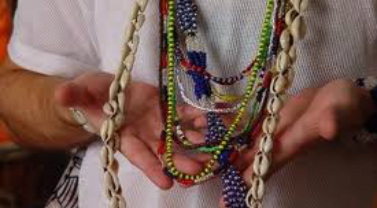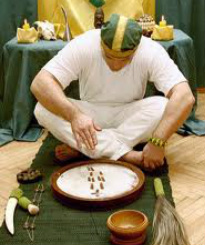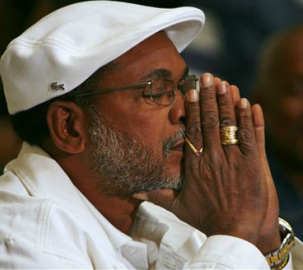Padrino and Madrina Are Titles of Respect
Padrino (Godfather) and Madrina (Godmother) are terms of respect used to address or refer to the person who initiated you into the Lucumí religion. The words come from Spanish, reflecting the religion's roots in Cuba. The godchild is called an ahijado (male) or ahijada (female).
Who Can Be a Godparent?

An Oloricha Wears Beaded Necklaces Called Elekes
A person who has been through the initiation process and completed all the required rituals is called an Oloricha, more commonly known as a Santero (male) or Santera (female). Only Olorichas can become godparents to another person. Once Olorichas initiate or "crown" another person, they become Babalorichas (male) and Iyalorichas (female). Babaloricha means father of the Orichas, and Iyaloricha means mother of the Orichas. This honorific title reflects the belief that the Godfather or Godmother is giving birth to the Orichas during the initiation ceremony, and the new godchild will inherit those Orichas from the godparent. Afterward, the godchild belongs to the religious family of the godparent, and the godparent and godchild have a permanent commitment to each other, based on a strong code of ethics that requires appropriate moral behavior on both sides. For example, the godchild is expected to include his godparent in prayers, calling them Babatobi Mi (my father who birthed me in Ocha) or Iyatobi Mi (my mother who birthed me in Ocha). He's also expected to remember his Madrina's or Padrino's "birthday in Ocha" (the anniversary of the godparent's initiation.) He should pay his respects in person if possible, and present his godparent with a gift of some kind to honor the godparent's Orichas.
Oyugbonas and Babalawos

A Babalawo Works With Orula
Santeros have a Padrino or a Madrina in Ocha (not both). In addition, they have a "second Godfather" or "second Godmother" called a Oyugbona (Yugbona, Yubona), who plays a very important part in the initiation ceremony. Customarily, female initiates have Madrinas and female Oyugbonas, and male initiates have Padrinos and male Oyugbonas. Although the Padrino or Madrina has the highest position of authority over the godchild, the Oyugbona is very important and should be remembered in prayers. The relationship between the godchild and the Oyugbona is formal and permanent, and governed by the same moral principles that exist in all godchildren-godparent relations. Some Santeros and Santeras may also have a Padrino in Ifá, known as a Babalawo, who gave them Mano de Orula (for men) or Cofá de Orula (for women). These ceremonies involving Orula can only be done by Babalawos. The Padrino in Ifá has authority over the godchild only in matters related to Orula, whereas the Padrino or Madrina in Ocha has authority over all other aspects of the godchild's religious life.
Crowning Godchildren

An Oloricha Has a Commitment to the Orichas
Every Oloricha must have a Godmother or Godfather in Ocha, but not all Ororichas go on to crown godchildren of their own. The initiation into Santería is often referred to as the "crowning" in Ocha, because the Orichas are placed on the head of the new initiate during the ceremony. The crown of the head is considered the most sacred spot on the body, because it's where the individual connects to the divine, and where the teachings of the Orichas enter into the body. To become a Padrino or Madrino requires a serious commitment to the godchildren, as well as extensive knowledge of the religion and an ability to teach and guide new initiates in religious instruction and training. Godparents know their reputations will be linked to their godchildren, so care must be taken to choose only those people who are likely to be "serious" about the religion, respectful to their elders, and morally upright in their behavior.
